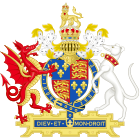Treason Act 1541 facts for kids
| Act of Parliament | |

|
|
| Long title | An Act for due Process to be had in High Treasons, in Cases of Lunacy or Madness. |
|---|---|
| Citation | 33 Hen. 8. c. 20 |
| Other legislation | |
| Repealed by | Statute Law Revision Act 1948 |
|
Status: Repealed
|
|
The Treason Act 1541 was an important law made by the Parliament of England. It was officially called the Consequences of Attainer for Treason Act 1541. Even though it was passed in 1542, it was dated 1541 because laws were often named after the year the Parliament session began.
This law dealt with a very serious crime called high treason. Treason meant going against the king or queen. The main purpose of this Act was to decide how to handle people accused of treason who later became mentally ill. The law itself said it was hard to tell if someone was truly ill or just pretending.
Contents
Understanding the Treason Act 1541
This law set out rules for trying people accused of treason. It focused on cases where a person committed treason while they were mentally well. But then, after being accused, they became mentally ill or "lunatic."
Rules for Trials
- When the Crime Happened: The law applied if the person was sane when they committed treason.
- After Accusation: It also applied if they were sane when they were accused and questioned by the King's council.
- Becoming Ill: If they then became mentally ill, the law explained what to do next.
If at least four members of the King's council believed the person was sane during the crime and their confession, a special group would investigate. This group would gather a jury and hold a trial. The trial would happen even if the accused person was not there because of their illness.
Evidence could be presented both for the accused person's defense and for the prosecution. If found guilty, the person would face the same punishment as someone who was sane.
Trials for Important People
The same rules applied to a peer of the realm. A peer was a very important person, like a duke or an earl. Instead of a regular jury, peers were tried by other peers. This trial took place before a special judge called the Lord High Steward.
What if Already Convicted?
Section II of the Act said that if someone was already found guilty of treason before they became mentally ill, they would still face their punishment. This meant they would be executed as planned.
Changes to the Law
This Act also applied to treasons that happened before the law was even passed. This is called being "retrospective." However, this law was later changed. The Treason Act 1554 reversed many of its effects.
Other Laws About Treason in 1542
| Criminal Law Act 1541 | |
|---|---|
| Act of Parliament | |

|
|
| Long title | An Act to proceed by Commission of Oyer and Determiner against such Persons as shall confess Treason, &c., without remanding the same to be tried in the Shire where the Offence was committed. |
| Citation | 33 Hen. 8. c. 23 |
In the same year, another law called the Criminal Law Act 1541 was passed. This law made a change to treason trials. It stopped people accused of treason from being able to reject jurors without giving a reason. This was called "peremptory challenge." This Act was also later repealed by the Treason Act 1554.
Another law from 1541, the Royal Assent by Commission Act 1541, created new types of high treason. However, these new treason crimes were removed in 1547.
See also
- High treason in the United Kingdom
- Treason Act
 | Claudette Colvin |
 | Myrlie Evers-Williams |
 | Alberta Odell Jones |

